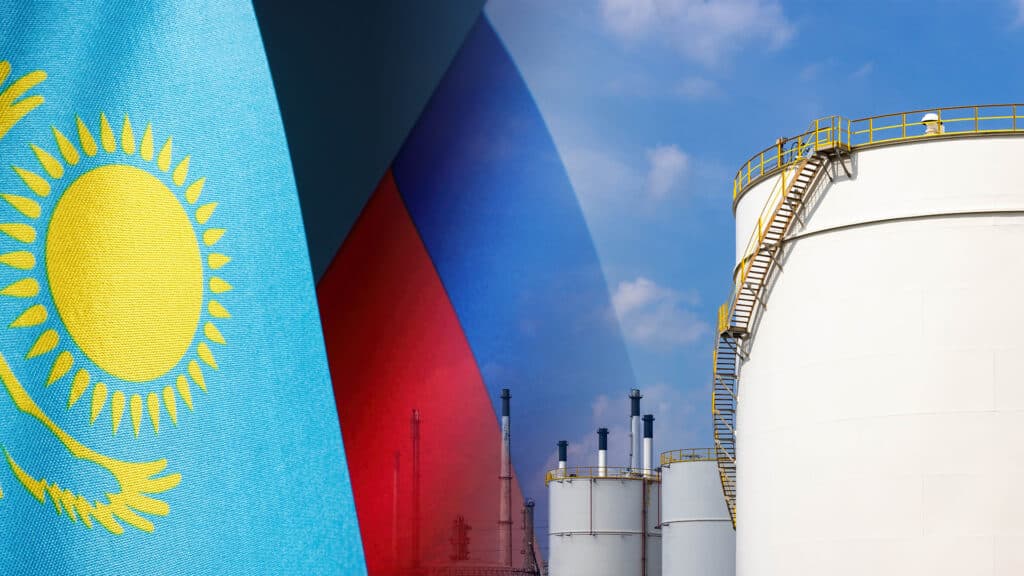Fitch believes that Kazakhstan will stay dependent on Russia for its oil exports

Fitch Ratings expects that Kazakhstan will continue to rely on Russia as the main export route for its oil.
«In 2023, almost all Kazakhstani oil exports were through Russia, as Kazakhstan is a landlocked country. Kazakhstan can export limited volumes through the Kazakhstan-China pipeline, via sea transportation through Azerbaijan, Georgia, and Turkey or by railway. However, these options are significantly more expensive and could require further investments in infrastructure. We assume that Kazakhstan will continue to be able to export oil through Russia and our forecast incorporates no sizeable politically-motivated interruptions to export flows,» said Fitch in a statement affirming KazMunayGas (KMG) at ‘BBB’ with a stable outlook (equal to the sovereign rating of Kazakhstan itself).
Fitch also pointed out that KMG’s profitability is constrained by the company’s high reliance on oil export routes via Russia. The profitability level is supported by its moderate scale of operations, adequate oil reserves and stable projected production. KMG’s upstream unit operating costs are low, though its cash flow generation is affected by high industry taxes and low domestic prices.
«We expect KMG’s production to remain broadly stable in the next four years, supported by an adequate proved reserve life of 16 years (including joint ventures),» the rating agency said.
In 2023, KMG’s production was 486,000 barrels per day including joint ventures or 252,000 barrels per day without joint ventures. The company was also involved in natural gas production, a materially less profitable activity than oil. KMG operates four main oil refineries in Kazakhstan and two in Romania, with a total throughput of around 400,000 barrels per day in 2023.
Fitch assesses KMG’s preservation of its government policy role as «strong,» based on its important role in the government’s energy strategy, its participation in most of Kazakhstan’s large oil projects and its control over the oil distribution infrastructure. Analysts of the agency also recalled that the Sovereign Wealth Fund Samruk-Kazyna purchased a 50% share of the group’s stake in the Kashagan field in 2015, which was bought back by KMG in 2022 when its financial position improved.
The agency also pointed out that although the state is contemplating increasing its free float from the current 3% through an international IPO of the company, it will maintain strong links with the group.
Fitch forecasts moderate dividends from KMG’s equity affiliates, averaging around $815.6 million annually from 2024 to 2027, which corresponds to around 35% of Fitch-projected funds from operations. Tengizchevroil, where KMG controls a 20% share and the Caspian Pipeline Consortium (CPC) (20.8%) are expected to be the main dividend contributors to that figure.
The analysts also expect that the oil company will boost its capital expenditures to $1.5 billion on average per annum in 2024-2027.
In turn, the CPC, which accounts for 80% of Kazakhstani oil exports, warned in May 2024 that oil throughput may decline by 7% from the initial plan of more than 70 million tons due to a decrease in oil production at the Tengiz field.
However, from January to May 2024, the company exported 26.7 million tons of oil versus 25.9 million tons over the same period last year, according to CEO of the CPC Nikolay Gorban. Over the first five months of the year, the CPC loaded 244 tankers with oil, five more vessels than in the previous year.
The CPC plans to boost its consolidated revenue from $2.3 billion in 2023 to $2.5 billion this year. On the other hand, the CPC-K (Kazakhstan) reported $460 million in revenue with $165.2 million in net profit.
To support operations of the pipeline, Russia and Kazakhstan are going to allocate $159 million and $40 million, respectively, to cover the CPC’s capital expenditures.
During a press conference on the financial results of 2023, Gorban described last year as a record year in terms of volumes of transported oil (63.5 million tons of oil in total), including 56 million tons of oil from Kazakhstan, a slight increase over 52.2 million tons in 2022.
Three oil fields in Kazakhstan – Tengiz (27.5 million tons of oil), Karachaganak (9.6 million tons) and Kashagan (17.9 million tons) – are the main exporters of oil going through the CPC. According to Gorban, the company has already received requests for transporting 70 million tons of oil this year.
The CPC runs a 1,511-kilometer pipeline from Tengiz to Novorossiysk, a Russian port on the Black Sea. Roughly 80% of all oil Kazakhstan exports abroad goes by this route along with oil from some smaller oil fields in Russia on the Caspian Sea. The company’s sea terminal is equipped with three single-point moorings, allowing for the safe loading of oil tankers offshore.
Among shareholders of the CPC are: Transneft on behalf of the Federal Agency for State Property Management of Russia (24%), CPC Company (7%), KMG (19%), Kazakhstan Pipeline Ventures LLC (1.75%), Chevron Caspian Pipeline Consortium Company (15%), LUKARCO B.V. (12.5%), Mobil Caspian Pipeline Company (7.5%), Rosneft-Shell Caspian Ventures Limited (7.5%), BG Overseas Holdings Limited (2%), Eni International N.A. N.V. S.ar.l. (2%) and Oryx Caspian Pipeline LLC (1.75%).

